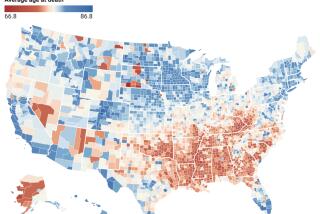Life’s Good; Less So for Rural Folks
- Share via
WASHINGTON — Americans are healthier than they were 25 years ago, and a government report offers some examples: longer life expectancy, better infant survival rates, fewer smokers, less hypertension and lower cholesterol levels.
But in small-town America, the health news is far from good, said an annual report released Monday by the Centers for Disease Control and Prevention in Atlanta.
Rural residents tend to smoke more, lose more teeth as they age and die sooner than suburban and many big-city counterparts, the government snapshot of the country’s health shows.
Researchers offered some reasons: People who live in rural areas are not getting as much preventive care and medical treatment as other Americans. Long distances to reach caregivers and the high rate of poverty among rural residents are two factors that make it tough to attract medical services.
For instance, heart attack victims could wait half an hour for the nearest ambulance, and small hospitals consider closing because they cannot hire enough nurses, said Mary Wakefield, a rural health policy expert at George Mason University in Fairfax, Va.
Urban areas are considered large cities with more than 1 million people; suburbs are larger towns on the fringes of the counties that have the largest cities. The most-rural areas are defined as counties without cities that include fewer than 10,000 people.
More to Read
Sign up for Essential California
The most important California stories and recommendations in your inbox every morning.
You may occasionally receive promotional content from the Los Angeles Times.











